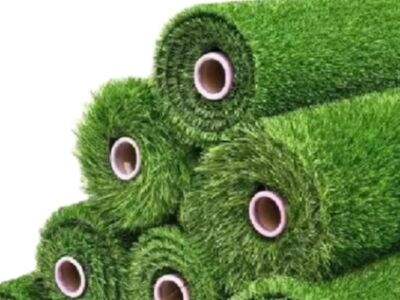If you are searching for the best type of grass for your yard, you have likely come across two major types: plastic grass and synthetic grass. While the names of these two types of grass may sound alike, there are many differences between the two. In the following guide we will be looking into plastic grass and synthetic grass in more detail, including the pros and cons of both. It will help you make an educated decision for your lawn.
Understanding Plastic Grass
But first, let’s talk about plastic grass. Artificial grass is also known as plastic grass, as it is made of plastic substances and is designed to mimic the appearance of natural grass. Low- Maintenance is one of the greatest advantages of plastic grass. That means you don’t have to worry about watering it, mowing it, treating it with fertilizer, as you would with real grass. If you have a tight schedule, this helps you a lot in saving time and effort.
But there are some disadvantages of plastic grass. One significant drawback is that, in the sun, plastic fake grass can become very hot. That makes it uncomfortable to walk on without shoes and again worse in the summer. For one, some individuals may not be fond of the way plastic grass looks or feels compared to the softness and natural look of real grass. It can occasionally feel coarse or plastic-y underfoot.
Advantages of Synthetic Grass
Now let’s get into synthetic grass. Synthetic grass is a type of artificial grass, however synthetic grass is manufactured differently than plastic grass. This type looks and feels more like real grass and is a popular selection for many homeowners. Synthetic grass is comparatively more robust and therefore better able to withstand heavy footfall, is one of its biggest benefits. That means it can work for play areas or sports fields or anywhere children and pets may run around. Less likely to fade in the sun, that means it will stay looking fresh for longer.
Synthetic grass is in fact better for the environment compared to plastic grass. because Artificial Grass requires less water and does not rely on the same chemicals as real grass does. As a result, it is a more efficient option for your lawn, an ideal scenario when it comes to conserving resources and protecting the environment.
The Environmental Impact of Synthetic Grass vs. Plastic
Plastic grass and synthetic grass also have each of their own environmental impacts, and it is important to understand what these are. Plastic grass consists of things that will last for years in the landfill and are not biodegradable, therefore harmful to the environment. Anyway, synthetic grass is made from recyclable materials. This means the grass can be reused or repurposed after being used for many years, minimizing waste.
Your training ends with data from October 2023.
So, when we compare how long these grasses last and the kind of maintenance they require, synthetic grass usually wins over plastic grass. Synthetic grass can last 20 years or more with the right care. That means you should not have to replace it very often.” However, plastic grass may require replacement more often as it can degrade or become damaged over time.
Synthetic grass has a lower maintenance requirement than plastic grass. Similar to plastic grass, there is no need to waste time on watering, mowing, or fertilising synthetic grass as you would with real grass. All you have to do is hose it down from time to time to make it look sharp and clean. This makes it an excellent option for busy families or anyone who desires a beautiful lawn with very little effort.
MYTHS: Common Guesses about Grass Options
There are a few myths that are commonly told about plastic and synthetic grass; that we would like to clear up to help you make a more informed decision. Myth#1: Synthetic Grass Is Not Safe For Children And Pets Actually synthetic grass is manufactured to be non-toxic and safe, making it completely safe for children and pets to play on. If you have kids or furry friends who love to play outside, this is an important consideration.
Another myth that exists is that synthetic grass is too expensive to install and upkeep. It may cost more upfront than plastic grass, but can save you money in the long run. This is due to the fact that the synthetic grass jūs goštati saving you will mean that you can reduce your water bills and also help you save money on maintenance costs. This makes it an intelligent investment over time.
All in all, plastic grass and synthetic grass both come with advantages and disadvantages. When determining which option will best suit your lawn, it is important to consider your individual needs/preferences. Synthetic grass might be the perfect option for you if you want something that does not need to be trimmed but is more environmentally friendly. If you prefer the real grass look and feel, plastic grass may work better. At the end of the day, it’s up to you; just make sure you choose the right grass for your yard and your lifestyle.

 AR
AR
 BG
BG
 HR
HR
 CS
CS
 DA
DA
 NL
NL
 FI
FI
 DE
DE
 IT
IT
 JA
JA
 KO
KO
 NO
NO
 PL
PL
 PT
PT
 RO
RO
 RU
RU
 SV
SV
 CA
CA
 IW
IW
 ID
ID
 LT
LT
 SR
SR
 SK
SK
 SL
SL
 UK
UK
 SQ
SQ
 ET
ET
 HU
HU
 TR
TR
 AF
AF
 MS
MS
 GA
GA
 CY
CY
 IS
IS
 HY
HY
 AZ
AZ
 MI
MI

/images/share.png)
